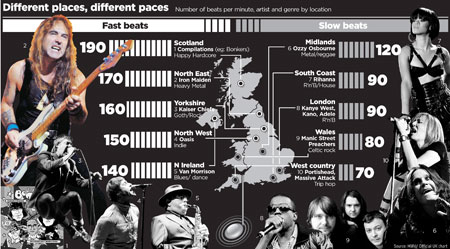The Null Device
2008/2/6
Following up from that piece on musical tastes in the UK, there's an article in the Graun speculating on how geography and history affect musical taste:
However, some music seems entrenched in certain areas, and while some believe this is due to the mystical forces exerted by ley lines, it is more likely attributable to a single act spawning an entire movement. "I think music is more determined by musical scenes that help create a distinctive sound," says academic and journalist Simon Frith, founder member of the International Association for the Study of Popular Music and chair of the Mercury music prize judging panel. "Glasgow has that history of guitar pop, and if you listen now to [Glasgow band] Glasvegas, it could be guitar pop of any age." Frith suggests that bands are inspired by the music that immediately precedes them - the music played perhaps by older siblings - and by the music that surrounds them, in local venues, on jukeboxes, radio stations. "The jangly guitars you hear in new Glasgow bands are the same jangly guitars you will hear played in Glasgow pubs," he says.
"I've looked at the fact that industrial Yorkshire and Lancashire are particularly strong areas for community-based music, such as brass bands, handbell ringing teams and choirs," he says. "They were all very powerful, particularly in smaller communities - it's partly to do with civic rivalries." Religion also played a big part, especially Methodism in Yorkshire. "Though John Wesley believed in the simplest form of music so as not to complicate the religious message, many of the local congregations took very enthusiastically to religious music, and so grew the choral tradition,"
In more recent times, Sheffield has shown itself to be home to music with a strong storytelling sense, with acts such as Pulp, the Arctic Monkeys and Richard Hawley. "The narrative thing I find interesting," says Frith, "because I always associated Sheffield with electronic music. It was the home of Warp and the Human League - though their songs did have a sense of narrative." Russell notes the strong love of amateur operatics in the area in the late 19th and early 20th century, "which created a love of humorous lyrics". Then, of course, came the music hall tradition. "And in some way the music hall spawned the very literate songwriting with wit and humour." It is precisely this we can see in the lyrics of Jarvis Cocker and Alex Turner.
But the Scottish love of American country and western is little more than a reclamation; country and western music was largely born of the music of the Appalachian Mountains, which itself was rooted in the music brought to American shores by immigrants from Europe, especially the British Isles. So country and western has much in common with traditional British folk music, Celtic music, and Scottish and Irish fiddle styles in particular. And those old habits die hard. "Apparently, karaoke caught on much quicker in Scotland and Ireland where they had the tradition of collective singing," adds Frith, "and where they had more of a tradition of the ballad."
A survey of music sales from HMV outlets has revealed variations in mainstream musical tastes across the UK.
According to this survey, music tempo increases the further north one gets, with the west country (birthplace of trip-hop) still chilling to downbeat ambience, while Scotland gets down to 190bpm happy hardcore, which The Times reports as "a musical experience more akin to being trapped inside a tumble-dryer with a power drill". Meanwhile, Northern Ireland is big on country music, Birmingham has kept its historical associations with heavy metal, the mainstream in London and the south-east is R&B (I wonder whether this includes grime and dubstep), Manchester is a stronghold of "indie" (by which presumably means of the NME/Carling/Xfm variety, given that this is a HMV sales survey), in Yorkshire they're into "goth", and in Leeds they don't like trendy NME bands.